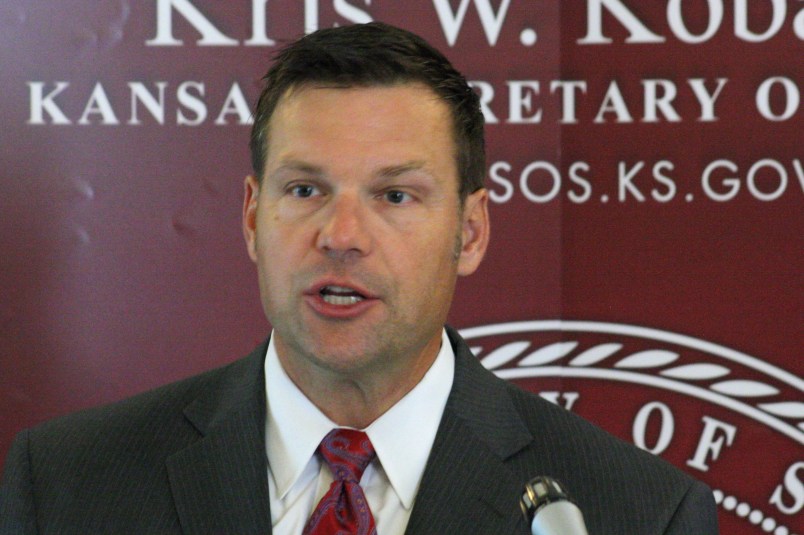Remember this phrase: two-tier voting. You may be hearing more about it.
Officials in Arizona and Kansas are making preparations for elections with two categories of voters. There will be those who provided proof of citizenship when they registered to vote, and will therefore be able to vote in all local, state, and federal elections. And then there will be those who did not provide proof of citizenship when they registered. Those people will only be able to vote in federal contests — if at all.
In both states, the preparations underway are reactions to the Supreme Court’s June ruling in Arizona v. Inter Tribal Council, the legal battle over Arizona’s 2004 voter identification law, known as Proposition 200. While the headlines in June painted the ruling as a blow to Proposition 200, officials in both Arizona and Kansas have chosen to focus on the leeway the Supreme Court left them. Kansas State Election Director Brad Bryant laid out the argument in an email he sent to county election officers at the end of July.
“As the Supreme Court made clear, its decision applies only to ‘federal registration forms’ and covers only federal elections,” Bryant wrote, according to a copy of the email provided to TPM. “States remain free to require proof of citizenship from voters who seek to also vote in state elections.”
Using that logic, both states have made moves toward two-tier systems.
In Kansas, whose Secretary of State, Kris Kobach (R), has been at the forefront of the voter ID movement, that system is already up and running.
Some context: state law in Kansas allows any qualified voter to register using either the state’s voter registration form or the national mail registration form, known as the “federal form.” All 50 states and the District of Columbia have state-specific instructions on the federal form. But Kansas has not been able to get the U.S. Election Assistance Commission (EAC), the agency which maintains the federal form, to change the Kansas-specific instructions to include proof-of-citizenship language. (More on the EAC issue later.) As a result, because Kansas can’t just ignore the federal forms, a Kansan who uses the federal form to register without a citizenship document will be allowed to vote in federal elections. (Kansas’ secretary of state’s office was unable to provide TPM with the statewide number of voters who have registered using a federal form, but Bryant’s July email states that “few” had been submitted to county officers over the years.)
Kansas officials have envisioned four registration scenarios: 1) Individuals who use the Kansas form and submit a citizenship document (eligible to vote in all elections); 2) Individuals who use the Kansas form and do not submit a citizenship document (not eligible to vote in any elections); 3) Individuals who use the federal form and submit a citizenship document (eligible to vote in all elections); and 4) Individuals who use the federal form and do not submit a citizenship document (eligible to vote only in federal elections.)
“It’s very frustrating to watch a public official go about voter suppression under the color of law,” Kansas state Rep. Jim Ward (D), an opponent of voter ID, told TPM in an interview on Monday. “I just think it’s reprehensible. It will create chaos on election day. … There’s a lot of advocacy groups now talking about registering people with the federal form.”
Compared to Kansas, Arizona’s two-tier system appears to be a few steps behind. On Monday, state Attorney General Tom Horne (R) sent a 16-page opinion to Secretary of State Ken Bennett (R). In it, Horne concluded that individuals who do not submit a citizenship document when registering to vote using the federal form are not eligible to vote for state and local races. Horne also stated that Arizona law allows the issuance of federal-races-only ballots to voters who registered using the federal form. According to Horne, Arizona law does not require a single ballot containing local, state, and federal races together, and the court’s have not barred a two-tier voting system.
“The courts that have examined dual registration systems have not specifically addressed an evidence-of-citizenship requirement,” Horne wrote in his opinion, which was publicly released. “Instead, the courts have disapproved dual registration systems for reasons distinguishable from the situation presented here.”
Now back to the EAC issue. At the end of August, Kansas and Arizona teamed up to sue the EAC in federal court, in an attempt to compel the agency to add proof-of-citizenship language to the state-specific instructions on the federal form. Kansas first asked the EAC to update its state instructions in August 2012, and re-upped that request in June. But the EAC has been unable to take action — it does not have enough commissioners to establish a quorum. In a press release announcing their lawsuit in August, Kansas and Arizona referenced specific language in the Supreme Court’s Arizona v. Inter Tribal Council decision, suggesting that Arizona should take the matter to court if the EAC’s “inaction persist.”
No one can say if any resolution to the court case will occur before the first votes are cast in the 2014 cycle.
“While it is impossible to predict when the court will render a decision, we desire and believe that it will be before the primary election in August 2014,” V. Kay Curtis, director of public affairs and legal publications for the Kansas secretary of state, told TPM in an email on Monday.






